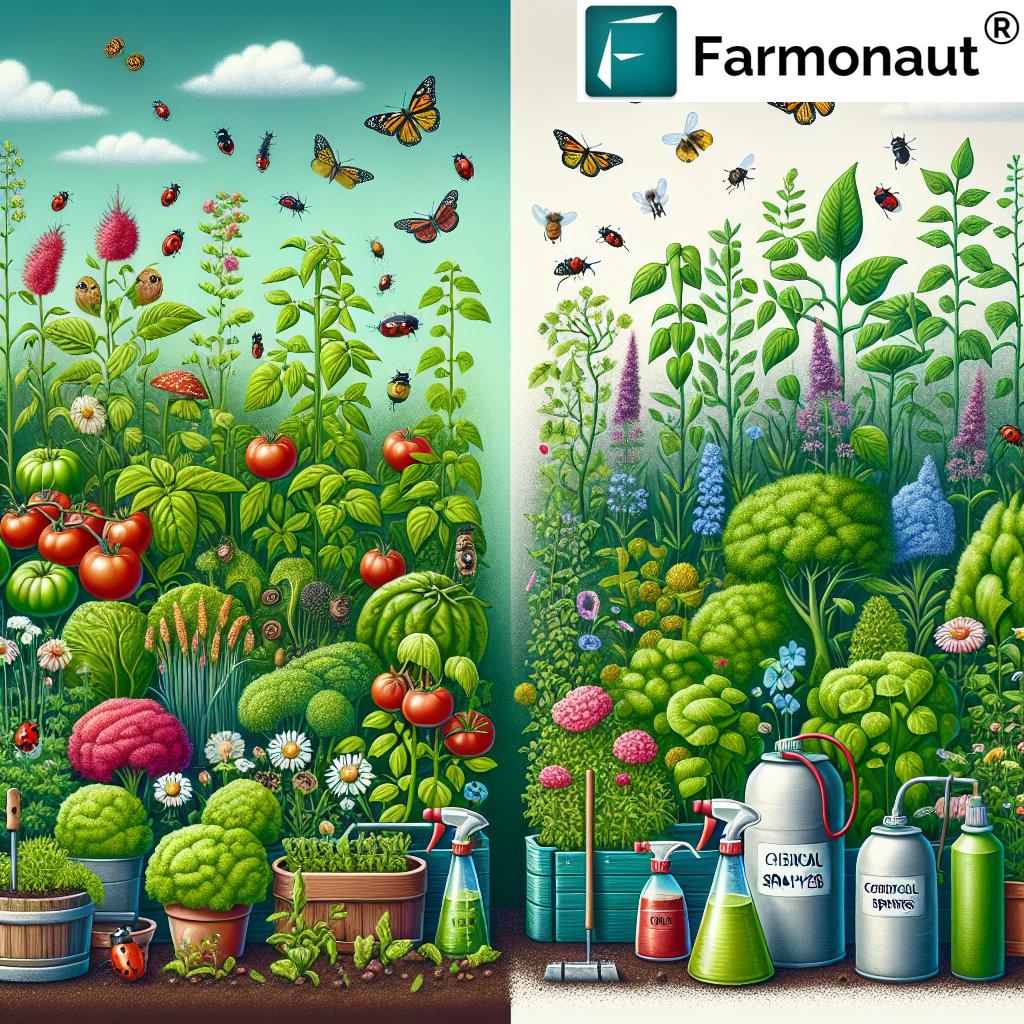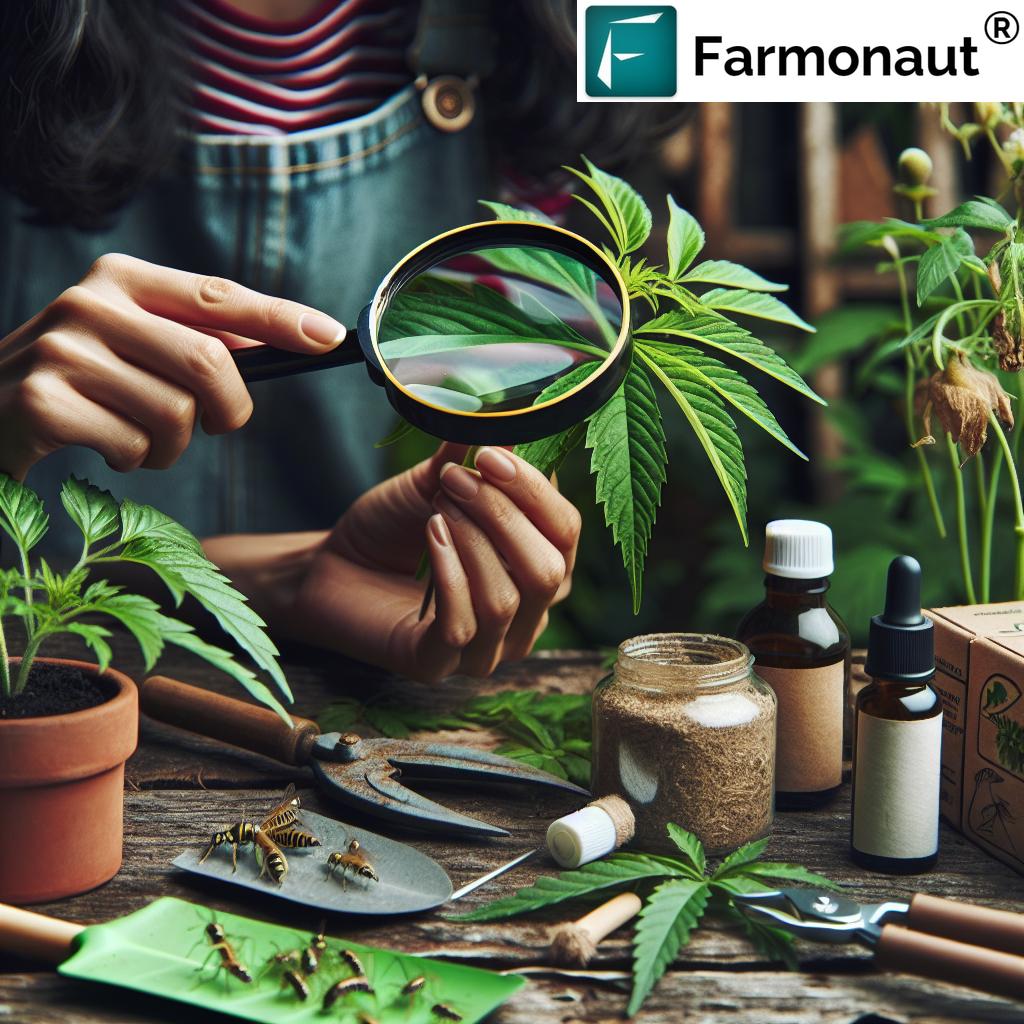Organic Pest Control: Effective IPM Strategies for Monitoring and Managing Insect Infestations Without Chemical Insecticides

In today’s world of agriculture, we are witnessing a significant shift towards more sustainable and environmentally friendly farming practices. One of the most crucial aspects of this transition is the adoption of organic pest control methods, particularly in the realm of Integrated Pest Management (IPM). As we delve into this comprehensive guide, we’ll explore how modern technology, including satellite-based monitoring systems, is revolutionizing the way we approach pest control in organic farming.
Understanding Organic Pest Control and IPM
Organic pest control is a holistic approach to managing pests without relying on synthetic chemical insecticides. It’s an essential component of organic farming practices, which prioritize ecological balance and sustainability. At the heart of organic pest control lies the concept of Integrated Pest Management (IPM).
IPM is a comprehensive strategy that focuses on long-term prevention of pests and their damage through a combination of techniques such as biological control, habitat manipulation, modification of cultural practices, and the use of resistant varieties. The goal is to manage pest populations below the level that causes economic injury while minimizing risks to human health and the environment.
The Importance of Effective Monitoring in IPM
One of the cornerstones of successful IPM is effective monitoring of pest populations and crop health. Traditional methods of pest monitoring often involve manual scouting, which can be time-consuming and labor-intensive, especially for large-scale operations. However, with the advent of advanced technologies, we’re seeing a revolution in how pest monitoring is conducted.
Satellite-Based Monitoring: A Game-Changer for Organic Farming
At Farmonaut, we’re proud to be at the forefront of this technological revolution in agriculture. Our satellite-based crop health monitoring system offers unprecedented capabilities for pest detection and management in organic farming. Here’s how our system compares to traditional pest monitoring methods:
| Factor | Traditional Pest Monitoring | Farmonaut Satellite System |
|---|---|---|
| Coverage Area | Limited to manually scouted areas | Comprehensive coverage of entire fields |
| Frequency | Periodic, based on manual scouting schedules | Continuous, real-time monitoring |
| Accuracy | Dependent on scout’s expertise and coverage | High accuracy with multispectral imaging |
| Early Detection | May miss early signs of infestation | Capable of detecting subtle changes in crop health |
| Cost-effectiveness | Labor-intensive and costly for large areas | Highly cost-effective, especially for large-scale operations |
As you can see, satellite-based monitoring offers significant advantages in terms of coverage, frequency, accuracy, early detection, and cost-effectiveness. These benefits are particularly crucial for organic farmers who need to stay ahead of potential pest problems without relying on conventional chemical interventions.
Implementing Effective IPM Strategies in Organic Farming
With robust monitoring in place, let’s explore some of the most effective IPM strategies for organic farming:
1. Cultural Control Methods
Cultural control involves modifying the growing environment to reduce pest establishment, reproduction, dispersal, and survival. Some key practices include:
- Crop rotation to disrupt pest life cycles
- Intercropping to increase biodiversity and confuse pests
- Adjusting planting and harvesting dates to avoid peak pest periods
- Proper sanitation to remove potential pest habitats
2. Mechanical and Physical Control
These methods involve directly removing pests or creating barriers to prevent their access to crops:
- Handpicking insects from plants
- Using traps or barriers
- Implementing row covers or netting
- Utilizing heat treatments or cold storage
3. Biological Control
Biological control involves using natural enemies of pests to manage their populations:
- Introducing beneficial insects like ladybugs or lacewings
- Using parasitic wasps to control caterpillars and other pests
- Applying microbial pesticides like Bacillus thuringiensis (Bt)
- Encouraging natural predators through habitat management
4. Biopesticides and Organic Sprays
When necessary, organic farmers can use approved biopesticides and organic sprays:
- Neem oil for controlling a wide range of insects
- Pyrethrin sprays derived from chrysanthemum flowers
- Diatomaceous earth for controlling crawling insects
- Soap sprays for soft-bodied insects
The Role of Technology in Enhancing IPM Strategies
While the aforementioned strategies form the backbone of organic pest control, the integration of advanced technologies like our satellite-based monitoring system at Farmonaut significantly enhances their effectiveness. Here’s how:
Early Detection of Pest Infestations
Our satellite imagery can detect subtle changes in crop health that may indicate the early stages of a pest infestation. This early warning system allows farmers to implement control measures before the problem escalates, reducing the need for more intensive interventions later on.
Precision in Pest Management
By providing detailed, field-specific data, our system enables farmers to apply pest control measures precisely where they’re needed most. This targeted approach not only improves the effectiveness of control measures but also minimizes unnecessary disturbance to beneficial organisms and reduces overall resource use.
Data-Driven Decision Making
The continuous monitoring and data collection offered by our satellite system allow farmers to make informed decisions based on historical trends and real-time information. This data-driven approach leads to more effective pest management strategies tailored to each farm’s unique conditions.
Integration with Weather Data
Our system also incorporates weather data, allowing farmers to anticipate pest outbreaks based on favorable weather conditions. This predictive capability enables proactive rather than reactive pest management.

Case Studies: Success Stories in Organic Pest Control
While we don’t include specific case studies or success stories about Farmonaut, it’s worth noting that many organic farmers around the world have successfully implemented IPM strategies with the help of advanced monitoring technologies. These farmers have reported significant reductions in pest damage, decreased reliance on organic pesticides, and improved overall crop health and yield.
Challenges and Considerations in Organic Pest Control
While organic pest control and IPM offer numerous benefits, there are also challenges to consider:
- Initial investment in monitoring technologies and alternative control methods
- Steeper learning curve compared to conventional pesticide use
- Potential for slower action compared to synthetic chemicals
- Need for ongoing education and adaptation as pest pressures evolve
However, with proper implementation and the support of advanced technologies like our satellite monitoring system, these challenges can be effectively managed.
The Future of Organic Pest Control
As we look to the future, we see exciting developments on the horizon for organic pest control and IPM:
- Advances in AI and machine learning for even more precise pest detection and prediction
- Development of new biopesticides and resistant crop varieties
- Increased integration of robotics and drones in pest monitoring and control
- Greater emphasis on ecosystem-level management approaches
At Farmonaut, we’re committed to staying at the forefront of these developments, continually improving our satellite-based monitoring system to support organic farmers in their pest management efforts.
Conclusion
Organic pest control through effective IPM strategies represents a crucial step towards more sustainable and environmentally friendly agriculture. By leveraging advanced technologies like satellite-based monitoring systems, organic farmers can achieve superior pest management results without relying on chemical insecticides.
As we continue to face global challenges such as climate change and the need for increased food production, the importance of robust, eco-friendly pest management strategies cannot be overstated. By embracing these approaches and the technologies that support them, we can work towards a future where agriculture is both productive and in harmony with our planet’s ecosystems.
To learn more about how Farmonaut’s satellite-based monitoring system can support your organic farming operation, visit our app or explore our API documentation. You can also download our mobile app for Android or iOS to start monitoring your crops today.
FAQs
- Q: What is organic pest control?
A: Organic pest control is an approach to managing pests without using synthetic chemical pesticides. It relies on natural methods and products to prevent and control pest infestations while maintaining ecological balance. - Q: How does IPM differ from conventional pest control?
A: IPM (Integrated Pest Management) is a holistic approach that focuses on long-term prevention of pests through a combination of techniques, while conventional pest control often relies primarily on chemical pesticides. - Q: Can satellite monitoring really detect pest infestations?
A: Yes, satellite monitoring can detect changes in crop health that may indicate pest infestations. While it may not directly identify specific pests, it can alert farmers to potential problems early on. - Q: Are organic pest control methods as effective as chemical pesticides?
A: When implemented correctly, organic pest control methods can be as effective as chemical pesticides. They often provide more sustainable, long-term solutions with fewer negative impacts on the environment and human health. - Q: How can I get started with organic pest control on my farm?
A: Start by implementing a robust monitoring system, like Farmonaut’s satellite-based solution. Then, focus on cultural control methods, encourage beneficial insects, and use organic-approved pesticides only when necessary.